

Related Literature. Books and publications Available from The Co-Intelligence Institute P.O.
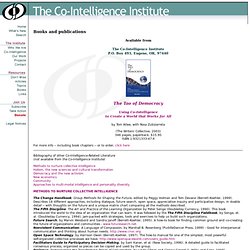
Box 493, Eugene, OR, 97440 The Tao of Democracy. The Spirit of the Internet - Table of Contents. IBM Collective intelligence. Making Sense of Collective Intelligence. CI capitalising on the crowd. Achieving Collective Intelligence: A Thinker's Guide on Why We Need... Le management paradoxal. CollectiveWebIntelligence.pdf (Objet application/pdf) Weaver-Attention.pdf. A Framework for scalable cognition by David R. Weinbaum on Prezi. A Unified Framework for Collective Systems. Collective intelligence system engineering. L'intelligence collective. On trouvera ici une versionPowerpoint™ de cet exposé.
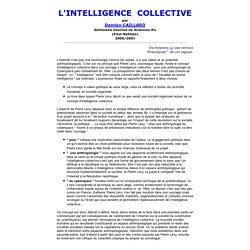
L’Internet n’est pas une technologie comme les autres, il a une valeur et un potentiel anthropologiques. C’est sur ce principe que Pierre Lévy, sociologue réputé, fonde le concept d’intelligence collective dans son ouvrage L’Intelligence collective : pour une anthropologie du cyberspace paru initialement en 1994. La juxtaposition des deux termes n’est pas choisie au hasard : ici, " intelligence " doit être compris comme dans le sens de " travailler en bonne intelligence " par exemple. L’expression finale se rapporte finalement à deux choses : Le concept à valeur politique au sens large, celui se référant à toutes les activités humaines en société organisée. I ? De par sa formation, Pierre Lévy a les compétences requises pour comprendre et analyser les problématiques liées à l’impact des nouvelles technologies sur les systèmes de signes et l’évolution culturelle en général.
Collective Intelligence 2012. Social-IST: D2.1 White Paper on Research Challenges in Social Collective Intelligence, WP2 – Research Challenges and Strategic Analysis. Executive Summary.
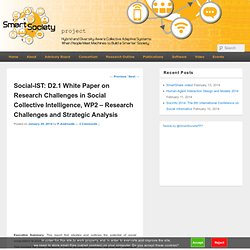
This report first situates and outlines the potential of social computation to provide the basis for Social Collective Intelligence (SCI) in future systems. This involves the close interaction of social groups and machines together with systems of incentives and social structures to perform tasks that would otherwise be difficult to achieve either using entirely human or entirely machine solutions. The deliverable considers the challenges both from a technical and from a social science standpoint, identifying the potential for aligning them in order to provide an interdisciplinary perspective on the development of SCI systems. The paper then describes some of the challenges in developing an engineering approach to the development of such systems. Finally the paper outlines some of the “big questions” that arise from the framework for SCI research developed in the white paper. Search Results. Showing 1 to 15 of 52 results Woodley, Michael A.; Bell, Edward – Intelligence, 2011 A recent paper [Woolley, Chabris, Pentland, Hashmi, & Malone. (2010).

Papers from Collective Intelligence 2012 Conference Now Online. Full text of papers presented at last week’s Collective Intelligence 2012 conference at MIT are now online and available for downloading.
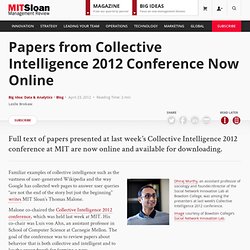
Dhiraj Murthy, an assistant professor of sociology and founder/director of the Social Network Innovation Lab at Bowdoin College, was among the presenters at last week’s Collective Intelligence 2012 conference. Évaluation et conception d'un langage symbolique pour l'intelligence collective : Vers un langage allégorique pour le Web. Overview of collective intelligence. BibTeX @MISC{Wolpert02overviewof, author = {David H.
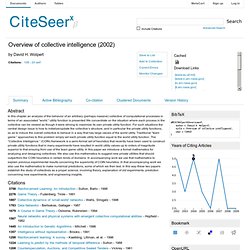
Hyper Cortex of Human Collective Intelligence system.pdf. Collective Knowledge Systems - CollectiveKnowledgeSystems.pdf. Adaptive Collective Systems - Herding black sheep. Collective Intelligence and Collective Leadership: Twin Paths to Beyond Chaos. - Sprouts. Artificial Intelligence Versus Collective Intelligence (1) We want scientifically-grounded two-way traffic between philosophy and the Web.

Technologies are ideas given flesh, the exteriorization of the conceptual structures and utopian impulses of humanity, and so are alien only insofar as their history and materiality are unknown. Artifactualization does not happen for and of itself, but reflects the ontological assumptions of their historical period. What is most interesting about the Web is it is clear that older philosophical categories like "mind" and "language" have to be fundamentally rethought. Thesis The Web is the rise of increasingly "intertwingled" techno-social assemblage that increasingly displaces the previous stable ontological assumption of the individual.
A disciple of Norbert Wiener, the psychologist J.C.R. "Man-Machine Symbiosis" by J.C.R. "The fig tree is pollinated only by the insect Blastophaga grossorun. AI attempted to define an individual on a level of abstraction and then implement this computationally. ChallengePropagation.pdf (Objet application/pdf) A participative method for crowdsourcing and extracting collective ... Collective Intelligence Book – MP Futures.
Tom Atlee, "Collective Intelligence: Creating a Prosperous World at Peace" Download All You Want - HeroTurko.com. Tom Atlee, "Collective Intelligence: Creating a Prosperous World at Peace" Ear th Intel gence Network | 2008 | ISBN: 097156616X | PDF | 648 pages | 6,6 MB The era of collective intelligence has begun in earnest. While others have written about the wisdom of crowds, an army of Davids, and smart mobs, this collection of essays for the first time brings together fifty-five pioneers in the emerging discipline of collective intelligence. They provide a base of tools for connecting people, producing high-functioning teams, collaborating at multiple scales, and encouraging effective peer-production. Emerging models are explored for digital deliberative democracy, self-governance, legislative transparency, true-cost accounting, and the ethical use of open sources and methods.
Tom Malone - Program for the Future Dec. 8. Creating a Prosperous World at Peace. Tovey-Collective-Intelligence.pdf. Semantic coordination of P2P collective intelligence. CoIL Bookstore. Collective-Intelligence-9-06-Pentland.pdf (Objet application/pdf) Programming Collective Intelligence. Book Description Want to tap the power behind search rankings, product recommendations, social bookmarking, and online matchmaking?

This fascinating book demonstrates how you can build Web 2.0 applications to mine the enormous amount of data created by people on the Internet. With the sophisticated algorithms in this book, you can write smart programs to access interesting datasets from other web sites, collect data from users of your own applications, and analyze and understand the data once you’ve found it. Programming Collective Intelligence takes you into the world of machine learning and statistics, and explains how to draw conclusions about user experience, marketing, personal tastes, and human behavior in general — all from information that you and others collect every day.
Each algorithm is described clearly and concisely with code that can immediately be used on your web site, blog, Wiki, or specialized application. “Bravo! Table of Contents Chapter 1. Appendix. Programming Collective Intelligence About me and why I read this book I've been programming professionally for ~7.5 years, mainly business applications and reporting, so I already have quite some love for data.

While I haven't used math much in my day jobs, I liked (and was good at) it in high school, including taking extra classes - so I have learned basic statistics. Refreshing and advancing my data analytics skills is one of my goals this year, and reading this book was part of the plan. About the book The book introduces lots of algorithms that can be used to gain new insight into any kind of data one might come across. Each of the algorithms is illustrated with real world application examples, and examples where applying them doesn't make sense are brought too. Designing for collective intelligence. A collective intelligence application is one that harnesses the knowledge and work of its users to provide the data for the application and to improve its usefulness.
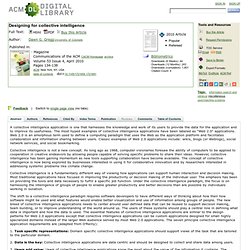
The most hyped examples of collective intelligence applications have been labeled as "Web 2.0" applications. Web 2.0 is an amorphous term used to define a computing paradigm that uses the Web as the application platform and facilitates collaboration and information sharing between users. Classic examples of Web 2.0 applications include: wikis, blogs (or Weblogs), social network services, and social bookmarking. Collective intelligence is not a new concept. As long ago as 1968, computer visionaries foresaw the ability of computers to be applied to cooperation in creative endeavors by allowing people capable of solving specific problems to share their ideas. Programming Collective Intelligence: Building Smart Web 2.0 Applications - Toby Segaran - Google Books.
Cs/9905004v1 [cs.LG] 10 May 1999 - 9905004.pdf. Collectives and Design Complex Systems - Kagan Tumer, David H. Wolpert - Google Books. Management intelligence collective_court. Carto2.0 - 2008_carto2.0_intelligence_collective_nerot.pdf. Karabeg-Lachica-KF08 - Karabeg-Lachica-KF08. Collective Intelligence At Work. Center for Collective Intelligence. Handbook of Collective Intelligence Edited by Thomas W. Malone and Michael S. Bernstein Collective intelligence has existed at least as long as humans have, because families, armies, countries, and companies have all--at least sometimes--acted collectively in ways that seem intelligent. But in the last decade or so a new kind of collective intelligence has emerged: groups of people and computers, connected by the Internet, collectively doing intelligent things.
Managing_collective_intelligence.pdf (Objet application/pdf) Managing collective intelligence. Table of Contents Introduction..................................................................................5 Chapter 1 Fostering the Emergence of an "Intelligent Enterprise"8 A. The three pillars of the intelligent enterprise..........................................8. Open Participation vs. Expert Groups: Biases and filters - The Collective Intelligence Blog. During the training workshops I give, the participants often ask me the following question: what are the advantages and disadvantages of the open participatory models vs. expert groups? This issue appears at almost every debate on collective intelligence. I could use Manichaean way of saying it: “collective intelligence ALWAYS works better than the experts“, but it is not true.
There are circumstances that give advantage to one option over the other, and even though both of them have their drawbacks. I used to think that the answer has laid in the level of the “technical” complexity of the problem. I thought if it was a very complex problem, with specific expert skills requirements, then the experts solution could work better. Let´s imagine for a moment that we need to solve a problem and there are two alternatives available to us: M2 Editions - Le management de l'intelligence collective - Olivier Zara. Le livre L’intelligence collective, le Knowledge Management, le développement durable, les technologies de l’information représentent aujourd’hui des défis importants pour toutes les organisations.
Mais au-delà de la théorie, des concepts, se pose la question du comment. Vous trouverez dans ce livre : - La présentation des enjeux : innovation participative, mesure de la performance collective dans une économie du savoir, développement durable,… - Un guide pratique du manager de l’intelligence collective (outils, méthodes, diagnostics,…), - Un guide pour les dirigeants et consultants pour la mise en œuvre opérationnelle de cette nouvelle gouvernance, - De nombreuses études de cas (General Electric, Siemens Nixdorf, Groupe Altran, Crédit Agricole, Temex,…). "Une remarquable contribution à un vrai défi", Nicole Notat, PDG de Vigeo et ancienne responsable de la CFDT. GP.pdf. Growth of Collective Intelligence by Linking Knowledge Workers through Social Media.pdf. Livres sur l’intelligence collective. Accepted Papers - Collective Intelligence 2012. Oral Presentations Visualizing collective discursive user interactions in online life science communities Dhiraj Murthy, Alexander Gross, and Stephanie Bond Group foraging in dynamic environments Michael E.
[1405.4298] How Much is the Whole Really More than the Sum of its Parts? 1 + 1 = 2.5: Superlinear Productivity in Collective Group Actions. Collective Intelligence in Action. There's a great deal of wisdom in a crowd, but how do you listen to a thousand people talking at once? Identifying the wants, needs, and knowledge of internet users can be like listening to a mob. In the Web 2.0 era, leveraging the collective power of user contributions, interactions, and feedback is the key to market dominance. A new category of powerful programming techniques lets you discover the patterns, inter-relationships, and individual profiles—the collective intelligence—locked in the data people leave behind as they surf websites, post blogs, and interact with other users. Net Culture, New Media And the Social Body. Comment créer un contexte social favorable à l'intelligence collect...
Intelligence collective livre_blanc_ic. The Wealth of Networks. The Wealth of Networks: How Social Production Transforms Markets and Freedom is a book by Harvard Law School professor Yochai Benkler published by Yale University Press on April 3, 2006.[1] A PDF of the book is downloadable under a Creative Commons Noncommercial Sharealike license.[2] Benkler has said that his editable online book is "an experiment of how books might be in the future", demonstrating how authors and readers might connect instantly or even collaborate.[3] Summary[edit] Conférence sur le management de l’intelligence collective en vidéo. Francis Heylighen. Wikipedia_as_a_complex_system.pdf. Harnessing Crowds: - SSRN-id1381502.pdf.